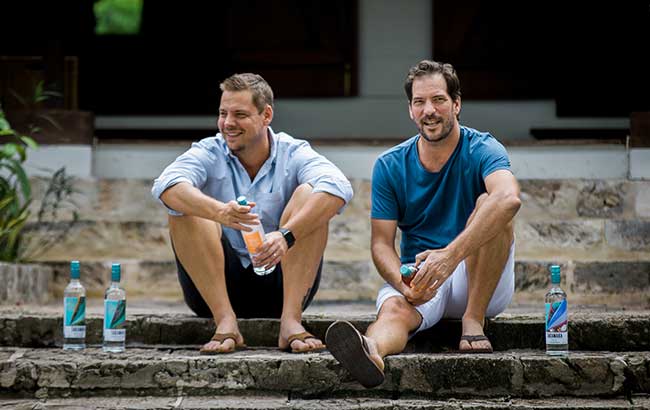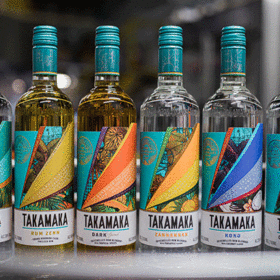SB meets… Bernard and Richard d’Offay, Takamaka Rum
By Kate MalczewskiSince 2002, the d’Offay brothers have been making Takamaka Rum in the Seychelles. We spoke to them about their distillery expansion and plans for the brand’s global growth.

You’ve been making rums for two decades, and are currently embarking on some major international expansion plans. Why now?
Bernard: It’s been a 20 year rum-making journey for us, and, you know, we’ve been making rum for the domestic market primarily. About five years ago, we decided to really embark on an export journey. And I think this is sort of what the next evolution of the brand is – our cask ageing programme is finally coming to fruition. We’ve got about 40,000 litres, so we sort of want to show it off around the world now. So yeah, we worked with some fantastic local artists here in Seychelles and Pearl Fisher in the UK to help us achieve and articulate our vision [for the brand’s new redesign] – how we want Takamaka to sort of look and feel moving forward. So you know, in a way we’re leaving our teenage years behind, sort of coming out to the world and trying to spread the message of Takamaka and Seychelles rum.
Richard: And we’ve recently completed the installation of the molasses distillery, so that’s also given us the opportunity now, with the extra production and the extra capacity, to export a lot more than before, so that’s great for us.
And how much extra capacity has that given you?
Richard: 200,000 litres right now, out of the molasses distillery. That can be scaled up quite easily, but as it stands now an extra 200,000 litres a year.
Bernard: So about 600,000 bottles, more or less. And that’s sort of a five-day working week. We could ramp it up if need be.
Richard: Of course, we’re more into three day working weeks, but we’ll see…
Which markets are your biggest targets for your expansion?
Bernard: So at the moment, the UK, Europe and the UAE are our primary markets, and we’ve been exporting around there for at least five years now. So next year we’re looking at opening up Asia, Australia, Canada, and hopefully in the years to come thereafter we’ll manage to get liquid on lips in all four corners of the world.
What are your ultimate goals for the brand?
Bernard: It would be fantastic to see Takamaka everywhere. You know, we don’t have the scale or the desire to be the next Bacardi or anything like that. But we certainly want to showcase amazing liquid and get our rums in cool bars and cool little retailers and get people drinking it. That would be awesome.

Is your focus primarily on the on- or off-trade?
Richard: It depends. So in the UK, it’s primarily on-trade. Whereas Germany is probably our second biggest export market at the moment, and that’s predominantly retail. The UAE is a nice comfortable blend. We’re in Dubai duty free and some fantastic venues all across Dubai as well. So it’s a bit of a mix, and I suppose it depends on the markets. Ideally, we’d like to be become a little bit more of an on-trade brand, adopted by great bartenders around the world.
What are the biggest challenges Takamaka faces?
Bernard: In a way, our isolation in Seychelles is our greatest strength and also our greatest weakness.
Richard: So as an example, logistics on the Seychelles, both incoming and outgoing, is a huge challenge because of where we are in the world, right? We can’t hold raw materials on a just-in-time basis, so we’ve got to plan months and months ahead. And especially in this environment, you know, with Covid that comes with its own set of challenges. So I would definitely say our isolation of being in Seychelles is a big challenge for us. But being in Seychelles also gives us that uniqueness in the world of rum, which we’re very proud of.
What do you think characterises a Seychelles rum?
Bernard: The reality is, there’s no commercial sugarcane industry in Seychelles. So we obviously had to adapt. All the sugarcane that’s grown for us at the moment is pretty much artisanal. We work with a cooperative of 40 farmers, some of them have 200 square metres of land, you know, others have 10 acres. Being a unique island, our terroir is especially unique. It’s the salt spray, it’s in the sugar cane, to little nooks and crannies and valleys – you know, where our cane grows. There’s very little flat land in Seychelles, so it’s all grown on mountain tops, steep slopes. Coupled with tropical ageing – it’s hot in Seychelles, especially for six months of the year – our rum takes a lot of wood very, very quickly. We have to be careful.
And can you tell me a little bit about your cask ageing programme?
Bernard: Sure. So we have 40,000 litres across 23 or 24 different styles of casks – everything from new French oak, to second-use Bourbon casks, to Port and Sherry. It’s very much about experimentation and blends. Our agricole programme is very interesting – our cane rum which we age almost exclusively in French oak, from medium toast to medium toast plus. And you know, Rich and I, every three months, we tap the cask, we have a taste. As these rums become ready for release, you know, they’re either going to be released as single casks, or as blend components as part of a new super-premium sipping range. There’s some fascinating liquid coming out, it’s exciting.
